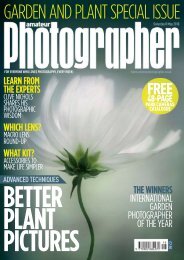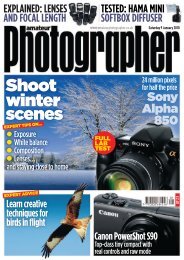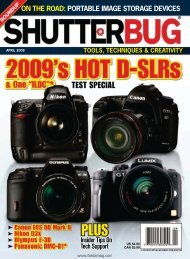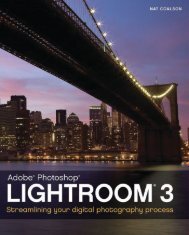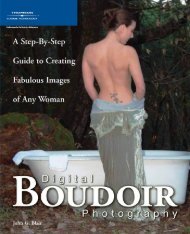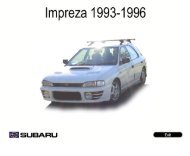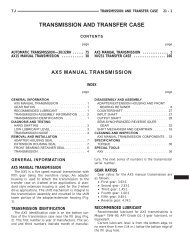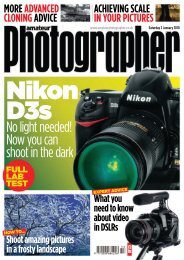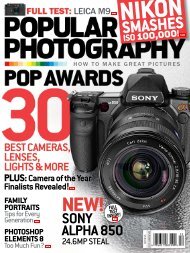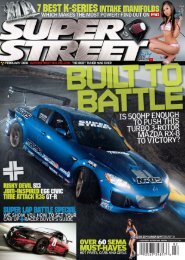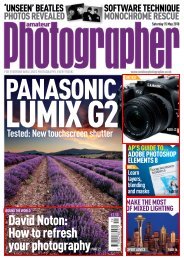Digital Camera - Ken Gilbert
Digital Camera - Ken Gilbert
Digital Camera - Ken Gilbert
Create successful ePaper yourself
Turn your PDF publications into a flip-book with our unique Google optimized e-Paper software.
108 The <strong>Digital</strong><strong>Camera</strong> inTerview<br />
MASon’STipS<br />
1learn how your<br />
cameraactually<br />
works, rather than just<br />
relying on the Auto or<br />
program mode.<br />
2learn about<br />
the sport you’re<br />
shooting – what certain<br />
players are likely to do<br />
when they celebrate,<br />
which leg they lead with<br />
over the hurdles, whose<br />
backhand shotworks<br />
in a picture and whose<br />
doesn’t,and so on.<br />
3learn to work<br />
with your lens. for<br />
example, if youwantto<br />
shoot football and you<br />
only have a 135mm lens<br />
to hand, don’t stack it full<br />
of teleconverters and<br />
crop the hell out of it if<br />
you’re trying to shoot<br />
midfield action. Simply<br />
sit behind the goal and<br />
shoot good goalmouth<br />
action instead.<br />
4look at the work<br />
of people who you<br />
regard as good at what<br />
they do and try to see if<br />
you can work out how<br />
theyshottheir pictures,<br />
whatshutter speed they<br />
used and so on. This is<br />
where the knowledge of<br />
howthe cameraworks is<br />
absolutely essential.<br />
5Take pictures – lots<br />
of them. Use and<br />
abuse the fact that you<br />
can instantly learn from<br />
your mistakes. Don’t<br />
keep anything other<br />
than your best. Get a set<br />
of 15-20 shots together,<br />
showing a variety of<br />
techniques and ideas,<br />
show it to whoever will<br />
look at it and learn from<br />
the criticism.<br />
<strong>Digital</strong><strong>Camera</strong> July2010<br />
2010 Winter<br />
Olympics<br />
Skier pascal bodmer of<br />
Germanyinaqualification<br />
round at this year’s Winter<br />
olympics in Whistler, Canada.<br />
Another expertpanning shot,<br />
this time taken on a nikon D3s<br />
as to what we can and can’t do with the<br />
images.iwould suggestsportsfans with<br />
an interest in photography begin where i did<br />
and that’sgrass-rootsfootball. Befriend a<br />
non-league club and trade pictures for access<br />
to their matches. Learn what worksand what<br />
doesn’t, and above all, enjoy it!”<br />
Capturing the moment<br />
Mason talked earlier about the difference<br />
modern cameras have made to sports<br />
photography. Forhim, the crucial advantage<br />
thatdigital cameras give him is to do with<br />
timing.“when shooting tennis, for example,<br />
getting the ball on the racket, or eveninthe<br />
frame,isahardthing to learn. digital<br />
cameras give you an image review so you<br />
can adjust your timing instantly.in the past,<br />
it could be toolate–the matchwas over<br />
before the films were processed and you saw<br />
that you were hundredths of a second out.”<br />
despitethe claims of some cynics(and<br />
luddites) that modern sports photos are<br />
doctored in Photoshop, Mason affirms that<br />
“Begin whereidid, andthat’satgrass-roots<br />
football.There aresomanyopportunities<br />
at non-league games, andunlimited access...<br />
Learn what works and what doesn’t”<br />
Getty photographers are heavily restricted<br />
when it comes to post-production.“we<br />
aren’t able to change an image in any way,<br />
except to remove sensor dustand tweak<br />
brightness and contrast.”<br />
Photographymagazinesare always on<br />
about shooting rAw, but for Mason, JPeG is<br />
the preferred format for speedy processing.<br />
“Getty decided thatthe advantages of rAw<br />
over JPeGin the editorial department were<br />
fairly limited. But there’snodoubt thatrAw<br />
is amuch betterscenario should therebeany<br />
exposure error; in JPeG we have to rely on<br />
our ability to produce a perfect exposure.”<br />
Mason’s career stretches back over 20<br />
years, so he’s seen lots of changes and<br />
learned lots of lessons. For any sports<br />
photographer,one of the biggestchallenges<br />
is making their work stand out.“you just<br />
have to rely on your abilitytocapturethe<br />
moment,” he believes.“it’s hard at an event<br />
likethe worldCup to produceanything<br />
different, because you’reflanked by other<br />
photographerswith the same viewpoint as<br />
you. F1 is different, as you can wander off<br />
on your own. you’remuch moreincontrol<br />
of your owndestiny. Football is about gritty<br />
action shots–it’snot ‘twinky’,for want of<br />
a better word, it is what it is!<br />
View Clive’s portfolio at globalassignment.<br />
gettyimages.com/Clive-Mason.



